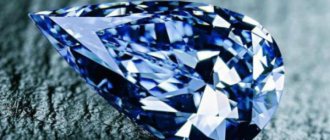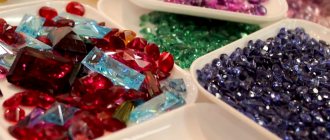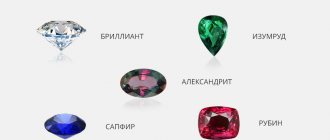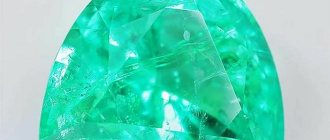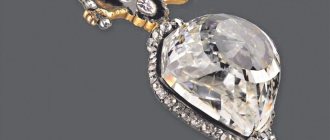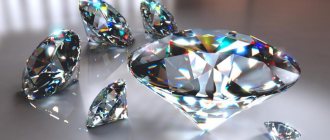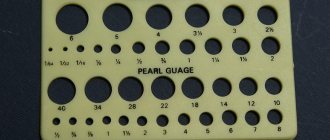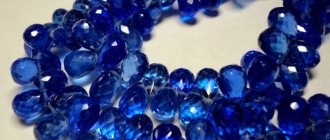Blue precious and semi-precious stones with good performance are relatively rare in the earth's crust. Despite this, their colors and properties are varied. Thanks to them, blue crystals become part of collections, decorative items and jewelry, allowing you to complete any look from a mysterious evening to a light everyday one.
Variety of blue stones
Representatives of this group are as diverse as the blue color palette. The main classification involves the division into precious, semi-precious and ornamental materials. Additionally, a gradation can be distinguished according to physical characteristics, chemical composition and cost.
For most of these types of stones, blue is the main color, but there are also types for which this shade is a rare exception, which makes them even more valuable and expensive.
Rules of care
Jewelry with blue gemstones should be cared for in the same way as other minerals:
- they are protected from contact with perfumes, cosmetics, and household chemicals;
- stored separately, especially not very hard stones (moonstone, turquoise, coral);
- Wash only with soap and water.
Almost all blue stones are afraid of the sun: with such exposure they fade or fade. Therefore, the jewelry cannot be worn on the beach or in the pool.
Characteristics of varieties
Each variety has its own unique differences, but the common color palette gives them a number of similar properties.
Precious rocks
Most of the most famous minerals can be classified as precious stones. They are used to make jewelry: pendants and pendants, necklaces, earrings, bracelets and rings.
Aquamarine
This translucent stone the color of sea water has long been considered the patron saint of warriors, sailors and wanderers traveling the sea. On land, aquamarine was one of the strongest family amulets.
| Characteristics | Description |
| Origin | One of the varieties of beryl |
| Shades | Light to dark blue, rare green and turquoise specimens |
| Mohs hardness | 8 units |
| Application area | Jewelry industry |
| Mining locations | Ural, Transbaikalia, Brazil, Nigeria, India, China, Argentina, Ireland, Norway |
| Frame | Silver, jewelry alloy |
From Latin the name of the stone is translated as “sea water”. Rare blue-green minerals are most often found in Brazil and the Ural Mountains. The weight of an aquamarine is directly related to the intensity of the color. Specimens weighing 1-2 carats look colorless and transparent.
Interesting! Another feature of the natural mineral is its ability to fade when exposed to light, so jewelry with it is stored only in closed boxes.
Sapphire
Translated from Persian, “sapphire” means “blue”. The stone has long been considered a symbol of royal power. Used as a talisman for men, making them more determined and purposeful. For women in the Middle Ages, sapphire was the personification of chastity and innocence.
| Characteristics | Description |
| Origin | Variety of corundum |
| Shades | The whole palette of blue, pink, yellow, purple, black, green, colorless |
| Mohs hardness | 9 units |
| Application area | Jewelry, medicine, industry |
| Mining locations | Burma, USA, China, Thailand, Australia, India, Madagascar, Sri Lanka islands |
| Frame | Silver, platinum, yellow gold |
In Russia, sapphire deposits were discovered on the Kola Peninsula. An artificial variety of this mineral is widely used for the manufacture of ophthalmic scalpels, microcircuits, lasers, and high-strength glass (watches, portholes).
Interesting! The ancient Persians believed that the earth was located on a giant blue sapphire, and the sky, in turn, was only a reflection of the color of this stone.
Spinel
Blue spinel is one of the most valuable minerals. It is used not only for finishing jewelry, but also for decorating church regalia.
Be sure to check out: Properties, compatibility and price of white jade
| Characteristics | Description |
| Origin | Random combination of magnesium oxide and aluminum |
| Shades | Blue, pink, burgundy, green, yellow, purple |
| Mohs hardness | 7.5-8 units |
| Application area | Jewelry industry, production of fireproof materials, durable paints |
| Mining locations | India, Australia, Afghanistan, Madagascar, Burma, Pamir (Tajikistan) |
| The best type of frame | Silver, gold |
The red variety is often confused with ruby. The price on the market for rare blue spinel is no less.
Interesting! Spinel is often called the trickster stone. It is often mistaken for more expensive precious minerals. A striking example is the “Black Prince” ruby, located in the crown of the British Empire. After examination, it turned out that this is a high-quality 170-carat red spinel.
MAGICAL AND HEALING PROPERTIES OF TOPAZ Topaz stone is an invaluable gift to humanity from the Earth.
It energizes and... Published by Empire of the Strongest Witches by Alena Wormwood Saturday, June 24, 2022
Topaz
The translucent stone of a soft blue color is affordable and therefore very popular. Topaz got its name from the island where it was first discovered - Topazios.
| Characteristics | Description |
| Origin | Aluminum silicate group |
| Shades | Blue, red, yellow, pink, light brown, golden orange |
| Mohs hardness | 8 units |
| Application area | Jewelry industry |
| Mining locations | Transbaikalia, Ural, Germany, Sri Lanka, Brazil |
| Frame | Silver, jewelry alloy, rose gold |
Dark blue crystals are marketed under the name "London Blue". Due to their rich color, they are often confused with sapphires. Sometimes, to obtain a similar shade, technologists irradiate colorless specimens.
Blue carbuncle
This stone is well known thanks to A. Conan Doyle and one of his works about the famous English detective.
| Characteristics | Description |
| Origin | Variety of pomegranate |
| Shades | Rich red, blue |
| Mohs hardness | 6.5-7.5 units |
| Application area | Jewelry industry |
| Mining locations | Burma, Tanzania, Sri Lanka |
| Frame | Silver, gold |
Among the ancient Slavs, the stone was considered a talisman of warriors and rulers. Its second name was “fireman”. The most valuable blue carbuncles are mined on the islands of Sri Lanka. They are distinguished by the ability to change hue when lighting changes: from bluish-green to purple.
Alexandrite
Another “changeable” stone. A sign of belonging to the royal family or the highest nobility. It is of “Russian” origin and named after Emperor Alexander II.
| Characteristics | Description |
| Origin | A variety of chrysoberyl |
| Shades | Color reverse effect (from cyan to magenta) |
| Mohs hardness | 8.5 units |
| Application area | Jewelry industry |
| Mining locations | India, Tanzania, Brazil, Zimbabwe, Ural, Sri Lanka, Kenya |
| Frame | Gold, platinum |
The stone has several names: imperial, widow's. The natural mineral is considered one of the most expensive in the world. The cost of 1 carat of high quality alexandrite varies from 17 to 22 thousand dollars.
Be sure to see: Properties and effects of black jade
Semi-precious minerals
Semi-precious minerals are most often used to make inexpensive jewelry or to accent a more valuable stone in a piece.
Zircon
One of the oldest minerals in the world. Blue zircons are not found in nature. This shade is achieved by heating brown crystals. The resulting material is called “starlite”.
| Characteristics | Description |
| Origin | Mineral of igneous origin |
| Shades | Brown, reddish, light green, blue, gray, colorless, purple |
| Mohs hardness | 7-8 units |
| Application area | Jewelry, medicine, industry (production of refractory materials) |
| Mining locations | USA, Brazil, Canada, Yakutia, Ural, Norway, Madagascar |
| Frame | Silver, yellow and white gold |
“A natural substitute for diamond” is what jewelers call the mineral. It often “accompanies” a diamond in the decoration of expensive jewelry. Today this mineral is gradually being replaced by cubic zirconia.
Larimar
Outwardly very reminiscent of the shimmer of light in sea water, larimar became known as the “stone of Atlantis.”
| Characteristics | Description |
| Origin | A variety of pectolite |
| Shades | Light blue, dark blue, turquoise blue, white |
| Mohs hardness | 5.5-6 units |
| Application area | Jewelry industry |
| Mining locations | Dominican Republic, Canada, Haiti, Bahamas, USA |
| Frame | Silver |
The name of the stone is made up of two components “lari” and “mar”. Jeweler Miguel Mendez, who officially registered this stone, took the name of his daughter Larisa as the first syllable, and the Spanish name of the sea as the second - “mar”.
Larimar is often confused with turquoise due to its hue, structure, and the matte nature of both stones.
Tourmaline contains: potassium, calcium, magnesium, manganese, iron, silicon, iodine, fluorine and other components.
Total 26... Posted by Amazing Tourmaline Monday, June 1, 2015
Blue tourmaline
Tourmaline is one of the minerals with the most unusual appearance. Depending on the shade, the stone is classified into different groups. For example, blue tourmaline is considered a precious type, and light brown is considered semi-precious or ornamental.
| Characteristics | Description |
| Origin | Mineral of variable chemical composition, consisting of more than 25 elements |
| Shades | Polychromic property: from pink and purple, through green and blue to almost black |
| Mohs hardness | 7-7.5 units |
| Application area | Jewelry field, radio engineering, medicine |
| Mining locations | Brazil, Sri Lanka, China, Afghanistan, Madagascar, Kola Peninsula |
| Frame | Gold, silver, jewelry alloy |
Pink tourmalines are produced by heating the red-brown mineral. Greenish-blue natural stones are extremely rare, mainly in Brazil in the Paraiba region, after which they are most often called.
Interesting! The famous Caesar's Ruby gem that adorns the crown of the Russian Empire is actually pink tourmaline.
Do you like jewelry with blue stones?
Not really
Blue chalcedony
The soft blue mineral can be either matte or translucent. It got its name from the ancient Greek city of Chalcedon. The blue variety is called "sapphirine".
| Characteristics | Description |
| Origin | Quartz variety |
| Shades | Reddish, brown, greenish blue, reddish brown |
| Mohs hardness | 6.5-7 units |
| Application area | Jewelry and ornaments area, production of support prisms, |
| Mining locations | Russia, Brazil, India, Scotland, Madagascar, Uruguay, Italy, Australia, Czech Republic |
| Frame | Silver, jewelry alloys |
The mineral is actively used not only to decorate jewelry, but also to create premium interior items. Varieties of chalcedony include carnelian, onyx, heliotrope, agate and chrysoprase.
Adularia
This mineral is better known as moonstone. It received its name in honor of the Swiss town of Adula, where its first deposit was discovered. With its appearance (white background with bluish tints) it resembles the night moon.
| Characteristics | Description |
| Origin | A variety of orthoclase |
| Shades | Transparent, yellowish, gray, matte white, pale blue |
| Mohs hardness | 6-5 units |
| Application area | Jewelry industry |
| Mining locations | Sri Lanka, Brazil, Burma, India, Tanzania, USA, Madagascar |
| Frame | Silver |
Most often, adularia is cut into cabochons, since in this form it increases its hardness. Due to its unusual appearance, it is endowed with numerous magical properties.
Ornamental types
The ornamental variety of stones is often used to create expensive interior items and fashion accessories.
Turquoise
A matte, opaque stone of a heavenly tone with shades of green attracts with its original weaving of lines and patterns. However, specimens of a pure, deep blue hue are most valued.
| Characteristics | Description |
| Origin | Mineral with a high content of copper and iron |
| Shades | Light blue, green-blue, green, light blue, white |
| Mohs hardness | 5-6 units |
| Application area | Jewelry industry |
| Mining locations | Iran, USA, Egypt, Israel, Ethiopia, Altai (Russia), Georgia, Azerbaijan |
| Frame | Silver |
Turquoise jewelry was found in the tomb of Tutankhamun and in the tombs of the Persian shahs. This is one of the oldest processed stones. It affects women and men wearing it differently. For the first, it guarantees the protection of the family hearth, and for the second, it gives courage and determination.
Interesting! According to mythology, turquoise is the bones of people who died from unhappy love.
Amazonite
A translucent stone of a noble white-blue hue looks very impressive and elegant. Outwardly very similar to jade. In ancient times, not only jewelry, but also ritual objects were made from this mineral.
| Characteristics | Description |
| Origin | A type of microcline |
| Shades | Blue, pale green |
| Mohs hardness | 6.5 units |
| Application area | Jewelry industry, design, interior items |
| Mining locations | USA, Southern Urals, Kola Peninsula |
| Frame | Silver |
Today, Amazonite is often used for inlaying expensive crafts and jewelry. It is considered a stone of psychics and clairvoyants.
Apatite
Translated from Greek, “apatite” means “stone of deception.” It was often used by scammers as an imitation of more expensive precious minerals.
| Characteristics | Description |
| Origin | Phosphate class mineral |
| Shades | Pink, yellow, blue, green, blue, purple, colorless |
| Mohs hardness | 5 units |
| Application area | Jewelry industry, agriculture |
| Mining locations | Italy, Finland, Czech Republic, Norway, USA, Mexico, Chile, South Africa, Kola Peninsula |
| Frame | Silver, jewelry alloy |
Jewelers use stones no larger than 5 carats due to their fragility and difficulty in cutting.
In addition to the described specimens, there are also blue quartz, kyanite, rare blue-blue diamonds from South Africa and lapis lazuli.
Magical and healing properties of blue stones
If we talk about the general properties attributed to this group, then it is worth mentioning the ability to calm, endow the owner with composure and determination, and enhance intuition.
Blue minerals are often family amulets, protectors of warriors and wanderers. They enhance potential, allow talent to reveal itself, and find harmony.
Lithotherapists believe that the energy of this color is capable of:
- improve sleep;
- calm your nerves;
- eliminate disturbances in the gastrointestinal tract;
- cure skin diseases and allergies.
Some types (sapphires) can, according to lithotherapy, resist cancer.
Artificial
Green varieties of minerals are often mined separately. Therefore, people have learned to produce them by heat treatment or irradiation. An artificial mineral is not considered a fake because its texture remains natural. Often manufacturers do not hide the origin of the stone.
For example, the Kaliningrad Amber Plant produces jewelry imitations of green amber - bernite and buranite. These are natural raw materials combined with natural resins.
The most famous examples are cubic zirconia and moissanite. A product of technology, an analogue of diamonds, recognized only with the help of specialized equipment.
Green cubic zirconia
Main conclusions
The variety of blue minerals allows you to create several types of classifications.
- The most common division is into precious, semi-precious and ornamental stones.
- In most cases, the blue tint is not a primary color, but a rare variety.
- The most popular types of frames are gold and silver.
- Minerals of this type are used in a variety of industries.
- The general magical and healing property is the acquisition of harmony and inner peace.
Depending on the type, a blue stone can become not only a bright accent in jewelry, but also a powerful protective talisman.
Share your impressions of these unusual stones and leave feedback in the comments.
Jewelry with gems
Delicate and elegant blue stones are in demand among manufacturers and buyers. Craftsmen often insert clear and translucent crystals into jewelry. Such items often become part of a jeweler’s exclusive collection.
Precious and semi-precious blue stones are set in gold frames, which gives them a luxurious shine and dazzling appearance. Such jewelry should be worn at special events and banquets. Jewelry set in silver is not just for the holidays. Such jewelry can be combined with everyday clothes.
Decorative and ornamental specimens, such as turquoise or chalcedony, are used to make costume jewelry and are often not set. In addition, these minerals are used to decorate interiors, furniture and household items, as well as for making souvenirs and trinkets.
When caring for jewelry with soft blue gems, you must follow a number of recommendations.
- Avoid contact with perfumes and cosmetics.
- Store separately to avoid damage as mineral hardness varies.
- Clean only with soap and water. The use of chemical products is prohibited.
With the variety of colors and shades of blue minerals, each person will choose a piece of jewelry to suit their taste or a talisman that suits their horoscope. And the strong energy of heavenly-colored gems will have a positive effect on health and lifestyle, adding the necessary qualities to the owner’s character.
